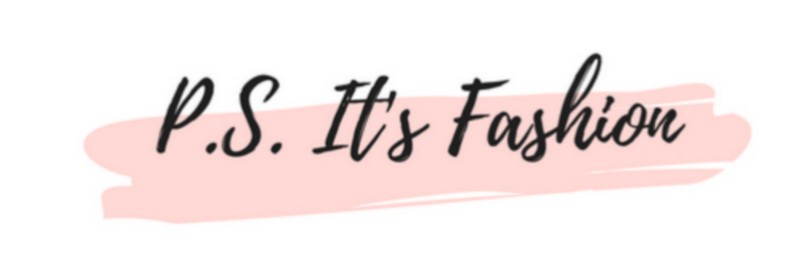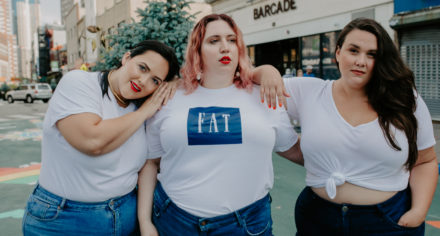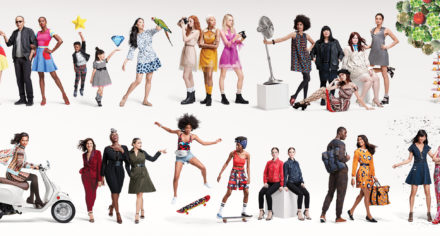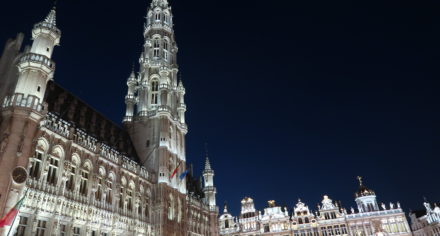(This article was originally written for, and appeared on, Refinery29. You can read the original here.)
There seems to always be some controversy within the modeling industry. A straight-size model will frequently be accused of being “too skinny,” while a plus-size model is implicated of either being “not plus-size enough” or “representing an unhealthy body.” It seems that no matter what side of the spectrum you fall on, you just can’t win.
But, while the fashion industry seems to have a grasp on what a “straight” model is, the definition of a “plus-size” model seems open to interpretation, depending on the designer. The average “plus-size” model wears a size 12/14, but appears thinner than that size due to her height.
To get a first-hand insight on what it’s like to be a “plus” model, we spoke with four well-known curvy models regarding their personal experience, what they think of the industry, and what’s the deal with the drama.
Candice Huffine 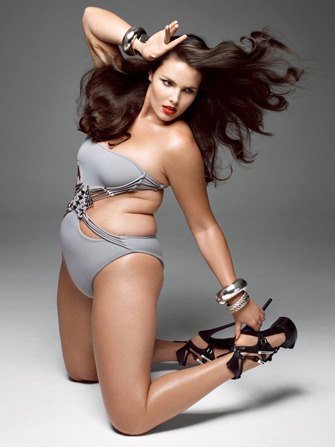
How did you get into modeling?
“I was a stage-loving little girl who wanted to be in the spotlight. I was in theater, a cheerleader, a dancer, even tried my hand at singing. It was ‘Candice The Pageant Queen’ that got the wheels in motion to end up here today. At a pageant, long ago, somewhere in Maryland, a woman in the audience leaned over and told my mother she should take me to New York one day to meet agencies. We hit the road and that was that. I can’t even tell you how lucky I feel and how happy it makes me to be doing this job. I sought it out, I wanted it, and I am amazed every day at all I’ve been able to be a part of.”
Do you feel that you should be just called a “model” or are you okay with being differentiated as a “plus-size model”?
“I get that that term is used to differentiate us as models, but we certainly don’t call the others ‘negative-sized!’ It’s just always been a term used to describe a larger woman, and I understand its existence, but I personally don’t use the term in my private life; I prefer curvy. As for which kind of model I am…both I guess; but really, who needs labels?”
Have you ever been encouraged to lose or gain weight in order to get a modeling job?
“When I was meeting with agencies hoping to be signed, the plus industry was very fresh; I honestly had no idea it was an option. As a result of that lack of info, I ended up seeing agencies who did not represent curvy girls. I was asked to lose 15 pounds. I was 14 years old at the time and hungry for a contract but knew that way of getting it was just not for me. I declined and was signed as a plus model that afternoon.”
Have you ever had to pad for a shoot?
“No, I actually never have. I have been asked by clients to bring it to set but have never used it. After some controversy kicked off about a year ago about plus-models wearing padding, I tried to explain it for Fashionista.com to set the record straight. We are all curvy girls at the end of the day. We are not lying about that — taking off our padding at the end of the day and really being a size two underneath — no, that’s not the case. Padding pretty much exists to make a shirt or pair of trousers look pristine. Whether the clothes fit like a glove or not, sometimes the camera just picks up odd wrinkles or gapes that need to be filled. I’ve put my own model card down my shirt before in order to keep the fabric from collapsing at the neckline. It’s all for the sake of getting the absolute best shot so that the customer can see the product in all of it fabulousness. Padding is not an enemy.”
Do you look at yourself as “plus-size”?
“Does the description ‘plus-size’ make me cringe because I find it isolating? Yes. Are there many stores I can’t shop in at its largest size because it doesn’t fit? Yes. In the end does this make me ‘plus-size’ in its literal definition? Well, then I guess so. I don’t describe myself as a plus woman, and I don’t describe myself as a slender woman. I am a woman, with a shape that is my own and sometimes hard to dress. You can call me any kind of size you want as long as I have amazing clothes to wear.”
Do you get upset when you see people commenting and saying that you don’t represent a plus-size woman?
“Extremely! I hit the ‘net quite frequently to see what women have to say about the brands that I often shoot for. Not because I want to read the comments on if they think I look pretty, but because I want to see if they are as excited about the clothing as I am. I have been in this industry for 13 years and literally modeled T-shirts with kittens on them and bad flared jeans at one time. That’s what curvy women were presented. It is an absolute joy and privilege to see all of the options and trends steadily being created and available to us! I want women to be excited about that. To feel and love the change. But, no, they don’t comment on the clothing; they write in because I’m not big enough for some of their tastes. I find this so rude. Do I need to show you all how some ‘regular’ lines don’t fit me in order to be accepted? I don’t get it. God seriously made every curvy woman different and unique. That’s the fun of it. That’s what makes our bodies fab and exciting. I’m 5’11”, who knows how many pounds, with hips that have been in the 44” range since high school, and broad shoulders. That is me. I don’t see why that’s infuriating to other curvy women — I thought we were all in this together and happy to be represented in mainstream fashion at all.”
Have you been treated differently by those in the industry because of your size?
“Never. This industry is amazing and gets better by the day! Now that we’ve made it past the ‘not-everyone-is-a-size-two mentality,’ it’s all groovy! I’ve been featured many times alongside said size twos without any mention or grand production about it. It’s normal now. We are models. Magazines are showing diversity. Everyone is represented. It is all so awesome.”
How do you feel about the plus-size fashion industry?
“I feel like it’s my family. It’s a part of me. We grew up together. I know whole-heartedly that we haven’t seen half of what’s in store for this industry. Fashion — excuse me, GREAT fashion — above a size 12 will be plentiful, easily accessible, and the curvy woman will be prevalent in mainstream fashion.”
If there’s anything at all you’d like to add or stories you’d like to tell, please feel free.
“I just want to add and speak briefly on my hatred of the words/terms ‘fatshionista,’ ‘fatittude,’ and anything involving the glamorization of the word fat. I find it to be a huge step in the wrong direction when describing style above a certain size or the sass of a curvy woman. We shouldn’t be giving such a scary and ugly word such power and certainly shouldn’t be putting it into anyone’s mind that we are okay with being called any form of the word no matter how catchy it has been made. People who don’t understand a larger body will assume their assumptions have been right all along — that we are unhealthy and if we stopped eating we could shop anywhere we wanted. I know that couldn’t be farther from the truth so we shouldn’t give those small minds the satisfaction of thinking they could be right. A curvy body DOES NOT equal poor health. I could eat kale every day for the rest of my life and still be this size. Bone doesn’t move, baby. However, I’m guessing it’s not very motivating or inspiring for designers to create new lines for us if we all just think we are fat. I just wish for us all to be really proud of the accomplishments and evolution of curvy fashion and the representation of different shapes in media and print. We don’t need to be kitschy in our approach, just confident.”
Fluvia Lacerda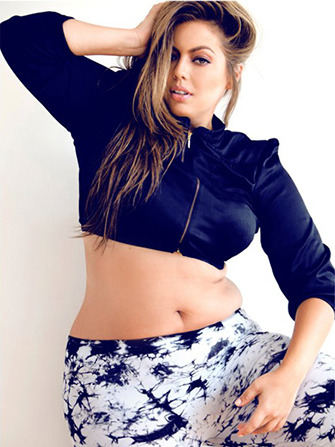
How did you get into modeling?
“I used to work as a nanny in NYC, and one day, while on a cross-town bus, I was stopped by a magazine editor, and she asked me if I had ever considered the idea of becoming a plus-size model. She gave me her card and told me briefly about agencies that had the divisions that worked with plus-size models and encouraged me to go visit them.”
Do you feel that you should be just called a “model” or are you okay with being differentiated as a “plus-size model?”
“Skinny jeans, A-line dress etc., those are just words to describe something we all know what it is, but to describe it specifically. It gives the costumer a way of identifying what exactly is been sold or talked about.
“That’s how I feel about the whole ‘model’ or ‘plus-size model.’ Obviously, Prada won’t book me for a modeling job because it most likely won’t ever build a product to be sold for a woman my size, which is an 18. So, I work for a specific niche and I don’t get what’s wrong about that. I don’t get why people in the industry seem to be so offended about it or so desperate to be included in the just ‘model’ bag. Yes, I am a model. That’s how I pay my bills. But, I model clothes for women who have a hard time finding clothes in the average shop, and they usually go to the plus-size section or label. It’s simple; and to me, really no big deal. If you look at me obviously you will know I am plus-size. I don’t wear 10, 12, or 14. I wear 18, sometimes 20. So, that’s my body shape and the industry I work with, and the women who keep me employed are plus-size. I have zero problems with been called a plus-size model.”
Have you ever been encouraged to lose or gain weight in order to get a modeling job?
“Always to lose weight. Truth is the plus-size industry is very contradictory one. Not too many labels like to actually book a big girl for a job; a lot of them will prefer to book a model much smaller than its best seller size (which in most cases, as I hear, is the size 16 up to 22) and have her wear padding. Also known as the ‘fat suit.’
“Labels and production companies sit on the same rather unproven fact that plus-size women don’t want to see themselves (as in, their sizes) in images. It’s pointless to discuss how untrue that is, but I always rest my case saying that if that were true I wouldn’t have such a successful career.”
Have you ever had to pad for a shoot?
“Never needed!”
Do you get upset when you see people commenting and saying that you don’t represent a plus-size woman?
“No. Like everything else in life, everyone will have an opinion about your looks. While the majority of my followers praise my work, there will always be someone unhappy, saying I’m not big enough, while most modeling agencies say I’m far too fat to be part of their plus-size divisions. You really have to laugh about it and keep doing what you do.”
Have you been treated differently by those in the industry because of your size?
“Yes, a few times. I had a client completely appalled by my size at the time I arrived at the photo shoot. Visibly and verbally so! To the point of whispering to a production director how upset she was that they booked me, saying (not really caring that everyone at the studio heard her) ‘I like making money off fat women, but it doesn’t mean I want one modeling for my company!’ Conflicting? Absolutely!”
If you could instantly lose weight and be a “regular” model, would you want to?
“No. I don’t find my body to be ‘irregular,’ if you will. I never learned that by being thin I could do more than I do today. I work out, I have a family, I’m healthy and a very happy person with the life I’ve been blessed with. Being instantly thin wouldn’t add anything that I already have.”
How do you feel about the plus-size fashion industry?
“It’s conflicting and sometimes rather absurd. It’s an industry that profits off women that most times companies can’t even prove that they can dress well, because, well, dressing a size 10 isn’t a challenge for anyone, correct?
“But for all it’s worth, it has made its dent on the very harsh and still strict fashion world, and even though the steps have been small and slow, incredible things have happened and progress is being made, thanks to a very passionate bunch that push harder and harder.”
Jessica Milagros Guzman Sanchez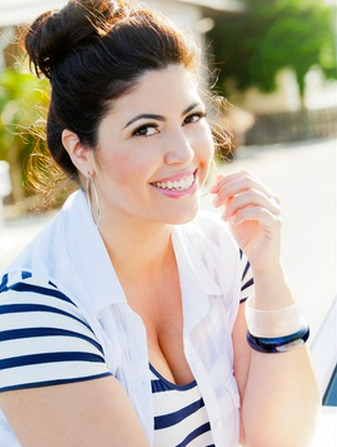
How did you get into modeling?
“I helped work on a marketing pitch for Lane Bryant a few years back. After researching and familiarizing myself with the plus-size market, I realized that there were models that looked like me, and it was encouraging. It took me a bit to warm up to the idea, but after a while, the most random of people were telling me that I should be a model, so I took it as a sign to give it try before it was too late.”
Do you feel that you should be just called a “model,” or are you okay with being differentiated as a “plus-size model?”
“I see myself as both a model and a plus-size model. Just like a straight-size model can be lifestyle or petite and some can be fit models. Being a plus model is just the same with the exception that it’s an under-appreciated category. But, I’m not ashamed of it. It’s like saying I’m less of an American because of my ethnicity and that’s complete bull.”
Have you ever been encouraged to lose or gain weight in order to get a modeling job?
“Every client is different. You win some; you lose some. I’ve never been told to lose weight, but I’m fortunate to have some clients that really like my body shape. However, as a model it’s very important to stay consistent with your measurements.”
Have you ever had to pad for a shoot?
“No, thank God. Unfortunately, I’ve heard some stories.”
Do you look at yourself as “plus-size?”
“I see myself as a curvaceous, full-figured woman who wears plus-size clothes.”
Do you get upset when you see people commenting and saying that you don’t represent a plus-size woman?
“Not really, but I get curious and I just ask them what a plus-size woman looks to them. It’s quite obvious to me that I am. What they think of me is none of my business.”
Have you been treated differently by those in the industry because of your size?
“I can say I have, but I feel those who I’ve dealt with would never admit to it, but I chalk it up to complete ignorance on their end. I don’t think the industry knows how to deal with us yet.”
If you could instantly lose weight and be a “regular” model, would you want to?
“Never. I love my curves. There are always areas of my body that I look to improve on and I work out for my overall better health not to be skinny. I know I’m not perfect; nobody is, but I love the body I’m in.”
How do you feel about the plus-size fashion industry?
“I feel the industry needs more size diversity. Models are getting skinnier and that those that model for major brands don’t even look like they fit into the clothes. Like any industry, it’s very competitive; however, I still feel that women in the plus industry have a better sense of camaraderie.”
Whitney Thompson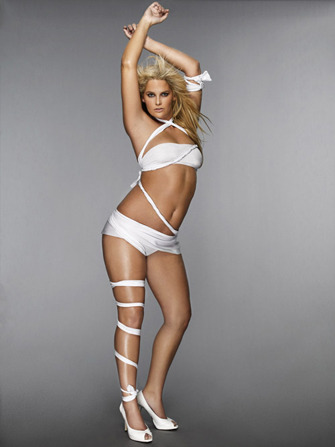
How did you get into modeling?
“I started as a ‘straight size’ model when I was 15, but I was never skinny enough to really move forward. I decided to quit modeling and go to school. I was ‘discovered’ to go on ANTM in an airport on spring break. I had gained the freshman 30 and would be considered a ‘plus’ model, which I loved because of my history with the industry and its unrealistic expectations.”
Do you feel that you should be just called a ‘model’ or are you okay with being differentiated as a “plus-size model”?
“My problem with the label ‘plus’ is that it’s not realistic. The average American woman is a size 14, and ‘plus’ begins at size six.”
Have you ever been encouraged to lose or gain weight in order to get a modeling job?
“The most difficult part of being plus is that you are always too fat or too skinny. Every casting wants you to gain or lose weight, and it’s very stressful because that’s obviously impossible.”
Have you ever had to pad for a shoot?
“I have had to use pads for several shoots. You have to get them as soon as you become a model. It’s required.”
Do you look at yourself as “plus-size?”
“I definitely do not view myself as ‘plus-size.’ When I go shopping, I don’t even wear a plus-size. As I walk down the street, I feel normal. I look like the majority of people walking around.”
Do you get upset when you see people commenting and saying that you don’t represent a plus-size woman?
“Absolutely. I agree with them, I’m not plus-size, but I don’t control the industry, and the most I can do is continue to model what I believe is a healthy standard, and hope that the industry takes notice. I am doing the best that I can with the resources that I have, and it is extremely frustrating when people don’t seem to notice how hard I work on their behalf to make things better. You just can’t win in this industry.”
Have you been treated differently by those in the industry because of your size?
“Well, I get to eat whatever I want on set, so that’s nice. The only time I feel that I’ve been treated differently is by other straight-size models. When there’s a casting with straight and plus, the straight girls tend to give us nasty looks and aren’t usually nice. I’d probably do the same if I were in their situation, though. We found a loophole. We get to be healthy and eat what we want, travel the world, make great money, and never get hassled about losing weight or getting old. Plus models have a great career, and I am eternally thankful for that.”
If you could instantly lose weight and be a “regular” model, would you want to?
“No. I love my job, not just because of the glamorous life, but the fan mail — the people paying attention really mean something to me. I want to make a difference, not just be a pretty face. That’s why I became an ambassador for the National Eating Disorders Association. I am so fulfilled doing my job.”
How do you feel about the plus-size fashion industry?
“We have come very far and we still have a long way to go. The industry is starting to come around to the idea of curves in fashion, but it takes time. SLiNK Magazine is my go-to for plus inspiration. This is our time. Life is too short to suffocate in the back of a store with polyester. Plus size deserves a front-row seat in the fashion capitals of the world.”
